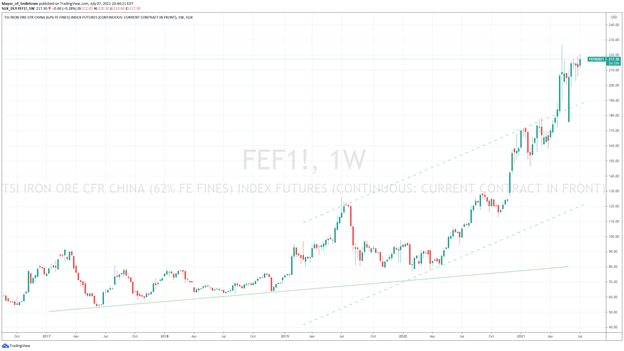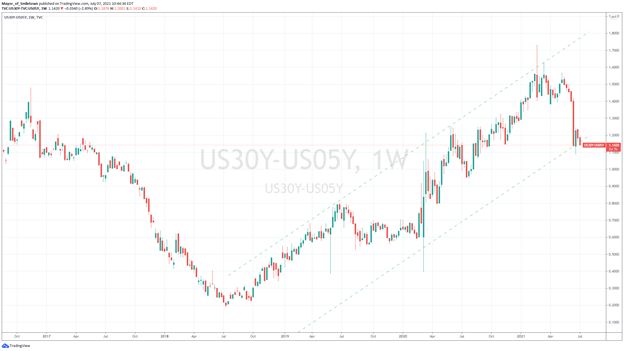MIDDAY MACRO - DAILY COLOR – 7/7/2021
OVERNIGHT/MORNING RECAP & MARKET ANALYSIS
Narratives/Price Action:
Equities are lower, on little new data as traders await the FOMC minutes
Treasuries are higher, with the long-end again outperforming
WTI is lower, with significant selling occurring post-NY-open
Analysis:
Equity markets are lower in what has become an all too familiar dance of lower yields supporting Nasdaq’s outperformance, although post-NY-open selling has all three indexes in the red currently.
The Nasdaq is outperforming the S&P and Russell with Growth, Low Volatility, and Higher Dividend Yield factors, and Technology, Cons Staples, and Utilities sectors outperforming.
An increase in S&P optionality strike levels with zero gamma strike moving higher to 4301 while the call wall continues to be at 4350; technical levels show support at 4305 and resistance at 4360.
The move lower in the 10yr Treasury yield has been impressive, with continued excess liquidity, Fed buying, flattener trades, and general lower yields globally keeping the trend going.
The debate is somewhat ongoing, but positioning for a Fed tightening sooner and a lower growth future continues to carry the day while those in reflationary-themed trades continue to take losses.
Growth in the U.S. has likely peaked as the supply-side disruptions we highlighted throughout the 2nd quarter have effectively capped growth potential for the rest of the year.
Earnings season, beginning next week will shed further light on how much growth has been capped and support what PMIs and regional Fed surveys have already shown.
However, high levels of pent-up demand supported by savings, rising wages, continued government support, and better household balance sheets (lower revolving debt levels) means, although growth may have peaked, it is certainly not going to fall off a cliff.
Eventually, the burden of higher and stickier price increases will deter consumer behavior, but we believe that we are a few quarters away from that.
Looking at China, the message from Beijing is mixed, but their stance is beginning to shift slightly as the self-orchestrated slowdown to curb inflationary pressures may be weighing too heavily on the economy.
Regulatory pressure against tech firms is increasing while strategic sales of metals from state reserves continue to show inflationary focused policy.
Meanwhile, there have been increases in the daily open market operations meant to support liquidity, while PBOC officials stated they are prepared to cut bank reserve requirement ratio to support “the real economy.”
Econ Data:
The number of job openings in the US rose to a new record high of 9.21 million in May, from a revised 9.19 million in April but below market expectations of 9.39 million. Job openings increased in several industries, with the largest gains being recorded in other services (+109,000), state and local government education (+46,000), and educational services (+35,000). The quits rate, which is a sign of labor market tightness, eased to 2.5% in May from an upwardly revised and record-high reading of 2.8% in April
Why it Matters: Today’s data continues the narrative that available jobs are plentiful and workers are quitting employment to find better opportunities. This “pickiness” by labor is also being noted in ISM and Fed regional survey comments. This all continues to support our view that we are now fully entering the wage-spiral part of the current inflationary cycle.
TECHNICALS / CHARTS
FOUR KEY MACRO HOUSE CHARTS:
Growth/Value Ratio: Growth Outperforming on the Week
Chinese Iron Ore Future Price: Iron Ore Higher on the Week
5yr-30yr Treasury Spread: Curve is Flatter on the Week
EUR/JPY FX Cross: Yen Higher on the Week
HOUSE THEMES / ARTICLES
MEDIUM-TERM THEMES:
Real Supply Side Constraints:
Food Hoarding: Supermarkets Are Stockpiling Inventory as Food Costs Rise – WSJ
Supermarkets are stocking up on everything from sugar to frozen meat before they get more pricey, girding for what some executives anticipate will be some of the highest price increases in recent memory. Stockpiling by food retailers is driving shortages of some staples, grocery industry executives said and is challenging a U.S. food supply chain already squeezed by transportation costs, labor pressure, and ingredient constraints.
Why it Matters:
When prices start rising, food sellers often purchase more inventory than they need to protect their profit. Price changes have been minor in recent years, executives said, generally involving a pool of specific products. The current price increases are bigger and are playing out more broadly across supermarket aisles, executives said. This behavior further pushes up prices in the current environment, given the supply-side disruptions. As a result, expect a longer-lasting food inflation pulse throughout the second half of the year.
China Macroprudential and Political Tightening:
Changing Attitudes: China Tech Rout Deepens as Beijing Targets Data, U.S. Listings - Bloomberg
In its brief statement on Tuesday, the State Council said rules for overseas listings would be revised, and publicly traded firms will be held accountable for keeping their data secure. It also said China would step up its regulatory oversight of companies trading in offshore Chinese companies have listed abroad outside of regulators' purview primarily through the Variable Interest Entity (VIE) model. That system has never been formally endorsed by Beijing but used by virtually every Chinese tech giant to tap foreign investors markets.
Why it Matters:
Beijing has grown increasingly concerned over the amount of sensitive information the nation's technology firms hold and the risk of exposure via IPOs. As a result, the political compromise that allowed the VIE structure to become so widely used is now under threat for sensitive industries. U.S. exchanges are also becoming more hostile to Chinese companies, which may face delisting if they refuse to hand over financial information to American regulators. All of this weighs heavily on the U.S.-listed Chinese tech firms, with the $KWEB ETF down around 40% from its 2021 highs.
Just Boycott It: Nike Shares Lose Out to Chinese Sneaker Rivals After Xinjiang Cotton Boycott – Bloomberg
Rising geopolitical tensions over accusations of forced labor in Xinjiang have become a severe threat to global companies trying to operate in China. Firms like Anta Sports Products and Li Ning, which have supported using materials from the contentious far west region, have gained market share as the Chinese switch away from foreign brands expressing concern.
Why it Matters:
The most significant carrot Beijing has is the Chinese consumer. It is what keeps American corporations lobbying to end sanctions and hostilities between the two nations. In the case of Nike, it is also what Beijing is quick to take away when a firm questions the practices of the CCP. It will be increasingly challenging for Western firms to embrace a more ESG culture and continue to do business in China. The growing "Wolf Warrior" nationalistic fervor further puts foreign firms at a disadvantage without any specific ESG stances.
LONGER-TERM THEMES:
Commodity Super Cycle Green.0:
Un-Stranded Assets: A $140bn asset sale: the investors cashing in on Big Oil's push to net-zero - FT
Under intense pressure from investors and activists to take more action on climate change, some of the world's biggest oil and gas companies are putting billions of dollars worth of assets up for sale. Private companies that don't face the same pressures to diversify are buying up these assets, sometimes at deep discounts.
Why it Matters:
Short-term production of oil and gas will increasingly shift to private or state-owned companies, which face much less scrutiny over their activities. Some of those new owners will use that relative obscurity to squeeze as much production as possible out of the oilfields they are acquiring without disclosing the environmental consequences. The bottom line is we still need fossil fuels. Forcing divestment will not curtail demand and increase the price while also not allowing offsets more environmentally conscious public companies may enact.














